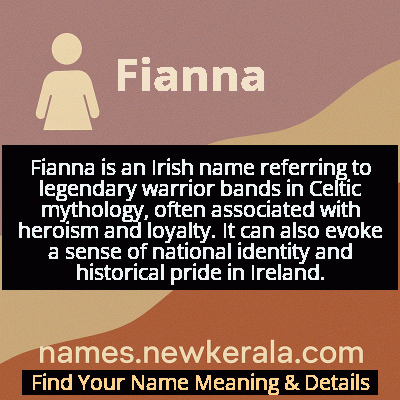Fianna Name Meaning & Details
Origin, Popularity, Numerology Analysis & Name Meaning of Fianna
Discover the origin, meaning, and cultural significance of the name FIANNA. Delve into its historical roots and explore the lasting impact it has had on communities and traditions.
Name
Fianna
Gender
Female
Origin
Celtic
Lucky Number
9
Meaning of the Name - Fianna
Fianna is an Irish name referring to legendary warrior bands in Celtic mythology, often associated with heroism and loyalty. It can also evoke a sense of national identity and historical pride in Ireland.
Fianna - Complete Numerology Analysis
Your Numerology Number
Based on Pythagorean Numerology System
Ruling Planet
Mars
Positive Nature
Generous, passionate, energetic, and humanitarian.
Negative Traits
Impulsive, impatient, moody, and can be overly emotional.
Lucky Colours
Red, maroon, scarlet.
Lucky Days
Tuesday.
Lucky Stones
Red coral, garnet.
Harmony Numbers
1, 2, 3, 6.
Best Suited Professions
Military, sports, philanthropy, leadership roles.
What People Like About You
Courage, energy, leadership, generosity.
Famous People Named Fianna
Fianna Fáil
Political Party
One of Ireland's major political parties founded in 1926, meaning 'Soldiers of Destiny'
Fianna Fallon
Irish Singer
Irish vocalist known for traditional and contemporary Celtic music performances
Fianna O'Keeffe
Cultural Preservationist
Prominent figure in Irish language and cultural preservation movements
Name Variations & International Equivalents
Click on blue names to explore their detailed meanings. Gray names with will be available soon.
Cultural & Historical Significance
The cultural impact extends beyond mythology into modern Irish identity, where the name symbolizes national pride, resistance, and the preservation of Celtic heritage. The political party Fianna Fáil ('Soldiers of Destiny'), founded by Éamon de Valera, consciously adopted this mythological reference to connect with Ireland's heroic past and revolutionary spirit. In contemporary Celtic communities, the name continues to represent strength, cultural continuity, and the enduring power of mythological traditions in shaping modern identity. The Fianna's legacy persists in literature, art, and cultural festivals, ensuring that this ancient warrior tradition remains relevant in the modern Celtic consciousness.
Extended Personality Analysis
Individuals named Fianna are often perceived as possessing strong, independent personalities with natural leadership qualities. They typically exhibit courage, determination, and a fierce loyalty to those they care about, mirroring the legendary warriors from whom the name derives. Many Fiannas demonstrate athletic prowess, competitive spirit, and a love for outdoor activities, reflecting the hunting and warrior traditions of their namesakes. They tend to be protective of family and friends, often taking on guardian roles in social circles.
Their personality often combines practical intelligence with intuitive understanding, making them excellent problem-solvers and strategic thinkers. While they can be strong-willed and occasionally stubborn, they usually balance this with compassion and a strong sense of justice. The name suggests someone who values honor, keeps promises, and stands up for their beliefs, even when facing adversity. Fiannas often excel in careers that require both mental acuity and physical presence, such as law enforcement, teaching, leadership positions, or athletic pursuits. They typically form deep, lasting relationships and are known for their reliability and unwavering support during difficult times.
Modern Usage & Popularity
In contemporary times, Fianna remains a distinctive and meaningful choice for parents seeking to honor Celtic heritage. While not among the most common names, it has maintained steady usage particularly in Ireland, Scottish communities, and among diaspora populations. The name experienced a modest resurgence during the Celtic revival movements of the late 20th century and continues to appeal to parents interested in mythological and strong female names. In recent years, it has gained some popularity in the United States and other English-speaking countries as unique Celtic names become more fashionable. Social Security data shows occasional usage in the US, though it remains outside the top 1000 names, preserving its distinctive quality. The name is particularly popular in regions with strong Irish cultural connections and among families valuing mythological and historical significance in name choices. Modern Fiannas often appreciate the name's unique combination of feminine grace and warrior strength, making it both distinctive and meaningful in contemporary society.
Symbolic & Spiritual Meanings
Symbolically, Fianna represents warrior spirit, feminine strength, and cultural continuity. The name embodies the concept of the 'warrior woman' in Celtic tradition – not merely in military terms but as a protector, guardian, and pillar of community. It symbolizes the connection between humanity and nature, reflecting the Fianna's legendary role as hunters and wilderness dwellers. Metaphorically, the name suggests someone who navigates life's challenges with grace and strength, maintaining loyalty to their principles and community. It represents the bridge between ancient wisdom and modern application, carrying forward traditional values into contemporary contexts. The symbolic meaning extends to concepts of freedom, independence, and the courage to stand against injustice, making it a powerful choice that conveys both historical depth and modern relevance. The name also symbolizes the preservation of cultural memory and the transmission of ancestral wisdom through generations, serving as a living connection to Celtic mythological traditions.

